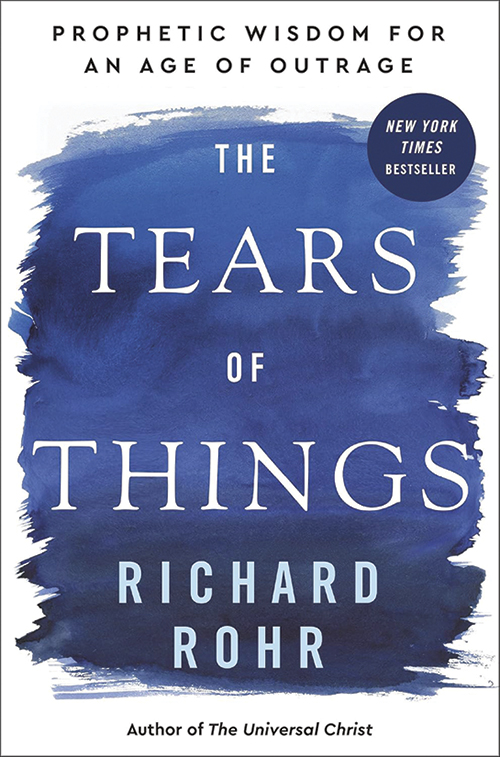
The Tears of Things: Prophetic Wisdom for an Age of Outrage
Reviewed by Windy Cooler
August 1, 2025
By Richard Rohr. Convergent Books, 2025. 208 pages. $27/hardcover; $13.99/eBook.
In The Tears of Things, Catholic priest and teacher Richard Rohr offers a luminous meditation on the prophetic vocation—one that Quakers, especially those called to public ministry, may find both deeply challenging and unexpectedly comforting. Rohr draws from the ancient Hebrew prophets (Amos, Jeremiah, Elijah, Isaiah, Ezekiel, and others), who, perhaps above all else, have a modern reputation for anger. But, as Rohr points out, when we look closely at their stories, we see that their anger matures into grief.
Jeremiah, for instance, writes first in the book bearing his name of impending violent catastrophe and divine retribution against a people who have given in to sin and who, he seemingly believes, deserve to be destroyed, but the story ends with a tender promise from the Divine: “I will restore you to health and I will heal your wounds” (Jeremiah 30:17). Through his careful reading, Rohr reframes what it means to be prophetic—not as one who merely denounces wrongs, but as one who suffers with the world and calls it lovingly toward wholeness.
Quakers often affirm that prophets are misunderstood in their own time, and many Friends who have spoken hard truths have known that pain firsthand. Some were dismissed for their message, others simply for their manner. As Rohr reminds us, prophets are rarely polished. They are not fortune-tellers but “full truth-tellers” who “pull back the veil to radically reframe our preferred storyline of history: the boring and predictable narrative of winners and losers, rewards and punishments.”
This vision resonates strongly with our Quaker testimony of continuing revelation. The true prophet, Rohr says, is one who can see with both clarity and compassion—not in dualities like right or wrong. But the journey to that kind of vision is not quick. Many begin in outrage, as they must, in response to injustice and pain. Yet prophetic anger, Rohr cautions, is not enough. “If we stay with our rage and resentment too long,” he writes, “we will righteously and unthinkingly pass on the hurt in ever new directions. . . . Forgiveness of reality—including tragic reality—is the heart of the matter.”
Instead of staying in anger, The Tears of Things asks us to consider tears as the prophet’s true inheritance. “Tears come from both awe and empathy,” Rohr says. Tears can transform not only how we see the world, but how we act within it. He writes, “[T]he soul must weep to be a soul at all.” For Friends who often begin their leadings in stillness, this insight is striking: weeping becomes a kind of waiting worship, a spiritual opening through which new life and vision may flow.
This spiritual maturity—what Rohr calls the movement from “unfinished prophets” to compassionate truth-tellers—is something many of us long for in our meetings and in our ministries. It is the difference between shouting from the margins and standing in community, speaking hard truths with tenderness and responsibility. As Friends navigate this time of division, loss, and urgency, this reminder feels important: “What you think is goodness is too often delusion, and what you think is bad just might be your spiritual best friend.” The prophetic path is not self-assured—it is surrendered.
Public ministry, as we understand it in the Quaker tradition, must be rooted not in self-righteous fury but in broken-hearted love. For Friends who feel despair, who are tempted to lash out in their grief or retreat into cynicism, The Tears of Things is a call back to the center. It offers no simple answers, but it does offer a tender map. As the poet Rainer Maria Rilke reminds us: “Everything terrible is something that needs our love.”
In the end, Rohr’s message is this: true prophecy does not stand apart in judgment; it opens in love. For Quakers committed to the healing of our communities and the world, this book is a wellspring. It reminds us that ministry is not about winning arguments but about walking with Spirit, eyes open and heart soft, ready to weep—and to act.
Windy Cooler is an embraced public minister under the care of Sandy Spring (Md.) Meeting (Baltimore Yearly Meeting) with a long-standing ministry of right relationship. She is currently the convener of Friends Incubator for Public Ministry (friendsincubator.org).
1 thought on “The Tears of Things: Prophetic Wisdom for an Age of Outrage”
Leave a Reply
Comments on Friendsjournal.org may be used in the Forum of the print magazine and may be edited for length and clarity.



I’m making my way through this book right now and I’m finding it to be both gentle and powerful. Richard Rohr is a gift that we need right now. Thank you for your review and for spreading the word about this book.